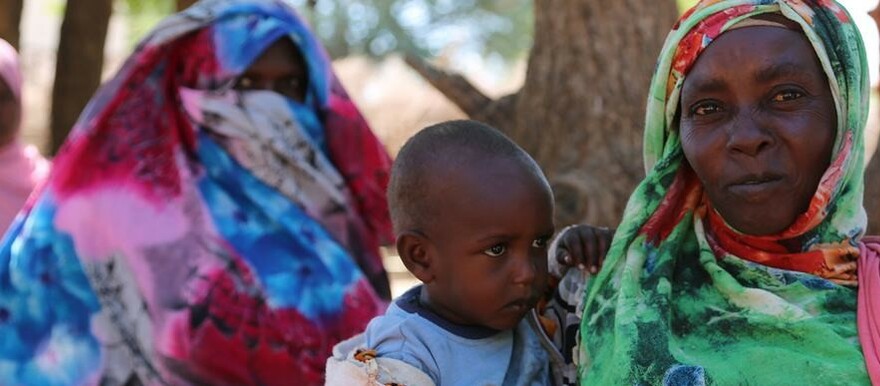The residents of El Fasher town in Sudan’s North Darfur State have raised concerns about ethnic-based targeting and threats by the Sudan Armed Forces (SAF) and its allied groups against individuals of specific ethnicities.
Fatima Abdullah recounted her ordeal to Radio Tamazuj, stating that she was compelled to flee El Fasher after her children became targets of the forces led by Sadik Fikka who are allied with the army.
“We encountered significant challenges due to the conflict between the Rapid Support Forces (RSF) and the army which forced us to leave El Fasher. It is not just me who is being targeted, but my children as well, which naturally affects me as a mother,” she explained. “Due to their appearance and language, my children are unable to go to the market, which is their primary source of income. They have been deprived of this since the conflict began.”
Abdullah accused the Sadik Fikka group of conducting arrests at transportation hubs in the town, particularly targeting individuals entering neighborhoods in the western part of the town, suggesting that her home was singled out based on ethnicity for theft.
She appealed to the conflicting parties to prioritize the welfare of innocent civilians unaffiliated with the RSF or the army, urging them to seek peaceful resolutions.
Abdullah added: “I implore the parties involved to consider the plight of innocent citizens because our collective cry is ‘No to War, Yes to Peace,’”
In El Fasher, there is evident racial segregation as individuals of African descent face restrictions on their movement in the eastern neighborhoods controlled by the RSF.
Meanwhile, journalists in North Darfur State voiced concerns about threats and intimidation by military entities. This follows discussions on social media regarding the assassination of a journalist, Khalid Balal, with suspicion pointing towards an armed group allegedly linked to the SAF’s Sixth Infantry Division command.
A journalist who spoke on condition of anonymity to avoid reprisals said all reporters covering the assassination of journalist Khalid Balal have been threatened by the military.
“The situation has become increasingly complex since the tragic incident in his home in the Dem Seluk suburb. Many journalists shared details about the incident and its significance on social media, as it marks the first murder of a journalist in North Darfur,” she stated. “Each of us posted comments on Facebook or messaging apps, and some shared statements from the Journalists’ Union and the Journalists Network regarding Khalid’s assassination. Consequently, all colleagues received anonymous threats aimed at intimidating or warning us against discussing the incident further, or cautioning against mentioning specific individuals with military ties.”
Another journalist, who also spoke on condition of anonymity, disclosed that all his colleagues in El Fasher have experienced harassment and threats from the military intelligence leadership in the city.
There is concern that these threats may compromise the professionalism and neutrality of journalists in North Darfur.
In a related incident, Salah Mahmoud, an employee of the Zakat Chamber, was threatened and targeted for murder, forcing him to flee his home in the El Fasher Secondary School neighborhood.
Efforts by this publication to contact the leadership of the SAF’s Sixth Division Command in El Fasher and the leaders of the Darfur movements regarding the accusations were futile.
Meanwhile, a political activist, Mohammed Hussein, told this publication that the pattern of violations is not new in modern Sudanese history.
“This was evidenced by the Anbar Goda incident and the response to peaceful protests in Darfur after the outbreak of war in 2003,” he observed. “Tribes classified by the state as potential rebels were targeted, leading to significant violations, along with unequal opportunities in public employment and restrictions in the private sector.”
According to Hussein, the current conflict employs similar methods on a larger scale, often victimizing groups labeled as rebellious by the armed forces. Such violations have occurred not only in Khartoum and Darfur but also in other regions indirectly affected by war but influenced by ethnic descent. He stressed the urgency of reevaluating the socio-political structure to end wars in Sudan.
The activist further noted active operations in El Fasher, including inspections and selective security crackdowns by the army, targeting individuals from specific ethnicities and areas associated with the RSF. Conversely, the RSF also suspects individuals based on their ethnicity and geographical origin, assuming they are military informants—a practice deeply entrenched in Sudanese military institutions.
In response to these allegations, the official spokesperson for the Joint Force of Armed Struggle Movements in Darfur, Ahmed Hussein Adroub, told Radio Tamazuj’s correspondent that the accusations are baseless.
“These claims lack merit as the armed movements do not threaten journalists as they believe in freedom of expression,” he insisted. “Such accusations are made by individuals for their interests.”




